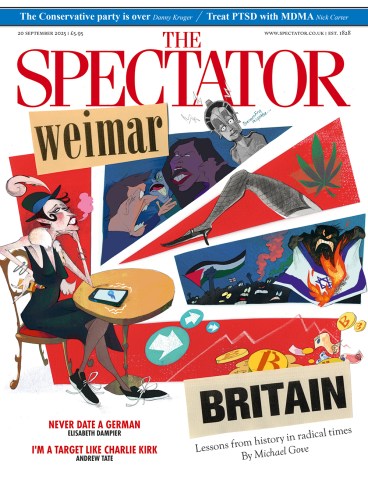
Call me unpatriotic but, although I’m German, nothing could ever have persuaded me to date a German man. I married an Englishman, finding Teutonic attitudes towards romance unbearable. Dating can go on for years, often ending in a quiet, dry dissolution after a decade. If you’re lucky, the relationship will limp on towards marriage, driven more by the need to save on taxes than any belief in what many Germans consider an antiquated institution.
Two hundred years ago, we had the tragic intensity of Goethe’s The Sorrows of Young Werther, a cornerstone of the Romantic movement. It was so wildly popular that it sparked one of the first waves of romantic consumerism: perfumes, clothing and even mugs depicting scenes from the novel were sold. Fast forward to today, and we have Fack ju Göhte (2013), a comedy about a German-Arab ex-convict who poses as a literature teacher to hunt down the buried loot referenced in Young Werther. The country that once led the Romantic revolution now seems less interested in all-consuming passion than in cultural self-destruction.
Instead of declarations of love, the modern German man is more likely to insist on splitting the bill 50/50, even on a first date – and heaven help the woman whose cash app request is off by even a cent. It’s no surprise that German jewellery shops and florists are disappearing – not just victims of an economic recession, but of a romantic one too.
It’s tempting to blame communism. The German Democratic Republic’s drive for total female workforce participation aimed at turning women into men, with a few biological differences. Some progressives still call this empowerment, but it mostly meant steamrolling over what many women actually wanted. Personally, I’d take babies over a factory floor any day. Preferably babies that arrive with flowers and a husband who doesn’t ask me to split the hospital bill.
Another culprit is western feminism, which encouraged women to demand equal rights. Too often, that has meant demanding to be treated as men rather than respected as a woman. If you browbeat any man who dares to open the door for you or offers up his seat, then soon almost none will. As these small gestures collapse, so does the architecture of romance, which must be built on an imbalance between the sexes.
Sadly, Germany’s unromantic streak can’t even be said to be a recent aberration, despite the excesses of communism and feminism. Perhaps there is something more fundamental in the German character. You only have to read Erich Kästner’s 1928 poem ‘Sachliche Romanze’ (‘Sobering Romance’), which gruesomely dissects the eight-year death of love into wordless nothingness, to wonder. Certainly, we are a practical, taciturn people, and have adapted to the world of elasticated waistbands and low-maintenance short hairstyles quickly. Far too often, it isn’t just the men you see wearing cargo trousers or stretchy hiking gear, but the women also. Mata Hari would struggle to maintain any mystique in brightly coloured moisture-wicking polyester.
That doesn’t fully explain the issue, however. The right-wing commentator Anabel Schunke has spoken about how far too many German men are a kartoffel (‘potato’) and compared them unfavourably with Turkish or Arab migrant men, who still bother to wear aftershave and offer expensive gifts. These talahons, as we call them in Germany (from an Arabic phrase meaning ‘come here’, popularised by a Syrian-German rapper), might like to wear designer tracksuits and get haircuts in barbers with black-and-gold colour schemes, but at least they make an effort in the dating arena.
It’s possible the old ways are making a comeback, thanks partly to Instagram. German men who use the platform have started to present themselves as gentlemen. Influencers like Justus Hansen pose in suits and Barbour jackets, happily putting one foot in the past and another in the present. Without an older generation to guide them, young German men are looking to the internet to discover forgotten traditions. It helps if they can look good in the traditional trachten (the English call them lederhosen). Similarly, German women have discovered ways to look sexy in the dirndl, that Germanic bodice and blouse combination.
There is an upside to German men. Even Tacitus, writing nearly 2,000 years ago, singled out the Germanic tribes for their rare commitment to monogamy: barbarians, yes, but loyal ones. Not much has changed. For all his quirks, the German man is generally a solid provider, faithful and competent with a toolbox. He’ll even stick around if you get an Angela Merkel bowl cut and go up three dress sizes. Just don’t ask him to give up the jean shorts, the bad haircuts or his beloved cargo joggers. There are limits to his love.







Comments